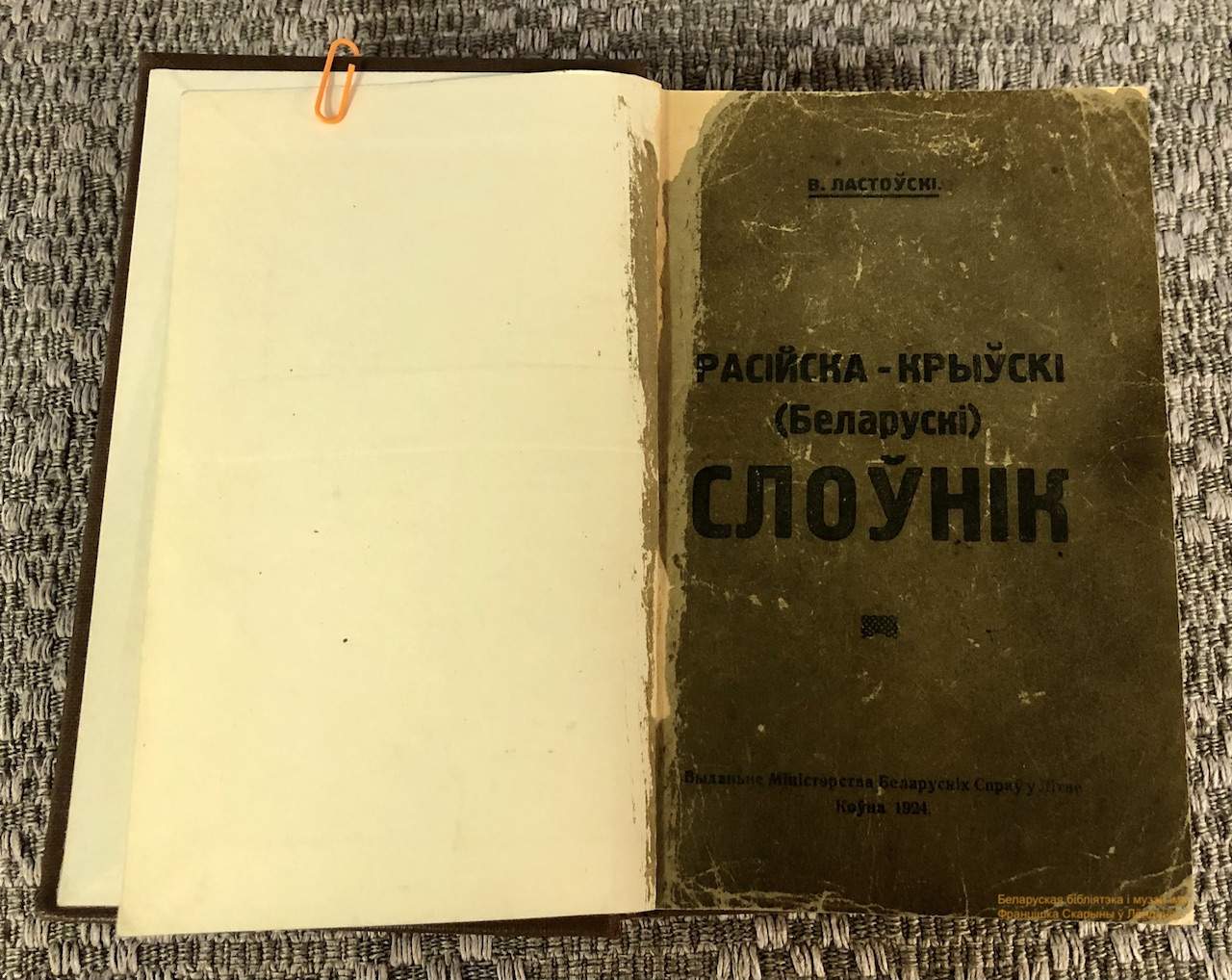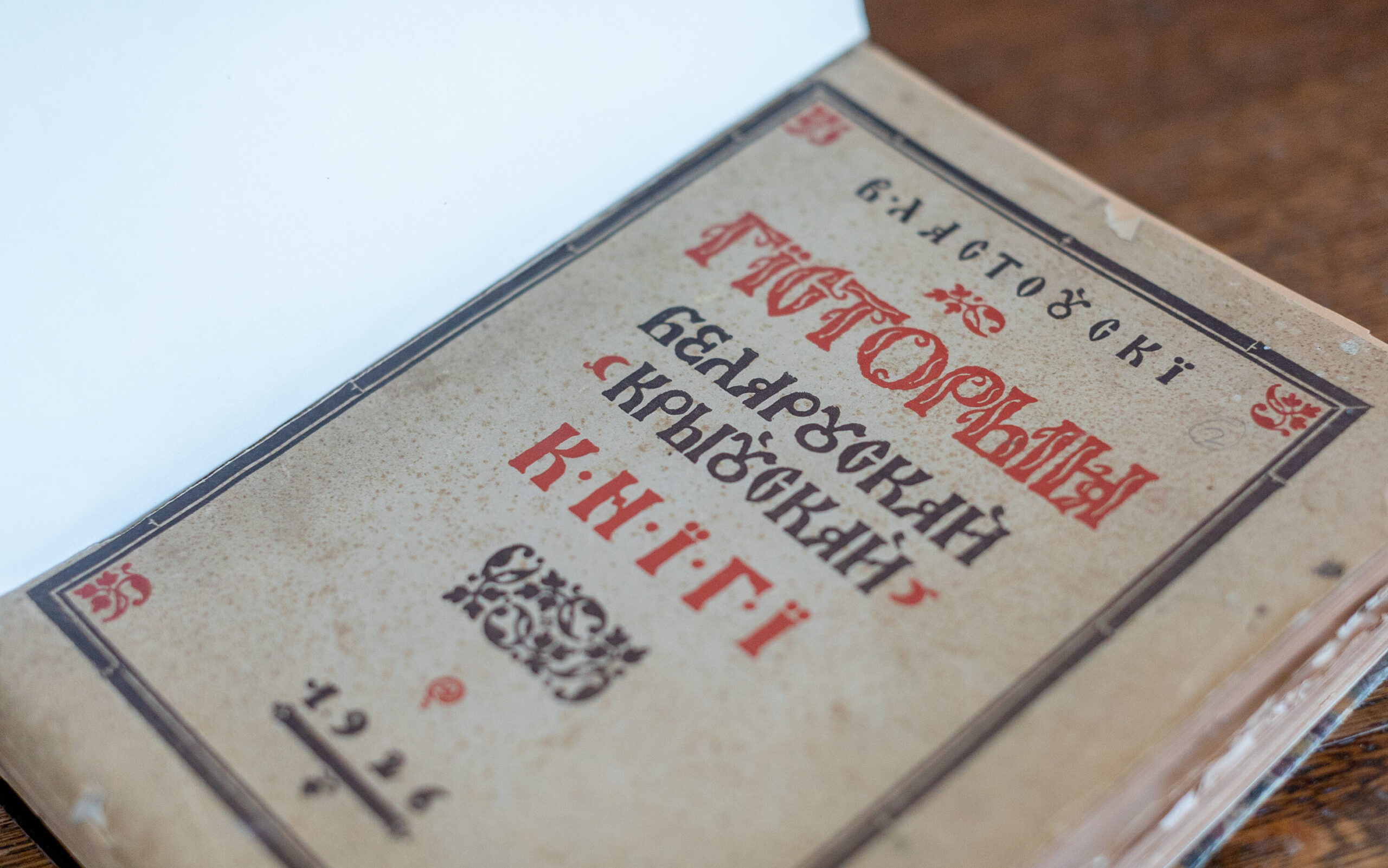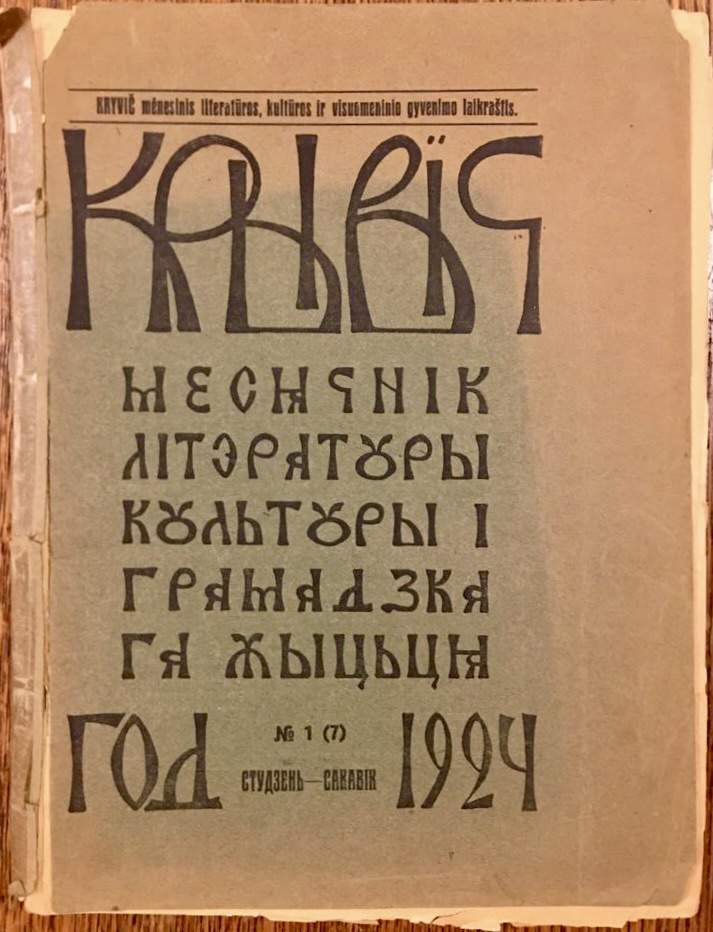Асаблівае месца на выставе належыць Вацлаву Ластоўскаму (1883 – 1938) – пісьменьніку, гісторыку, этнографу, публіцысту і палітычнаму дзеячу, аднаму з “айцоў” беларускага адраджэньня пачатку ХХ стагодзьдзя.
Паходжаньнем са зьбяднелай шляхты Віцебшчыны, Ластоўскі далучыўся да нацыянальнага, грамадзкага і культурнага руху пасьля рэвалюцыі 1905 г. У 1909 г. ён, інтэлектуал-самавук, стаў сакратаром рэдакцыі “Нашае Нівы” і адным з найбольш рэгулярных ейных аўтараў. Ад 1 студзеня 1910 г. тут пачала друкавацца ягоная “Кароткая гісторыя Беларусі” – першы агляд гісторыі нашай зямлі, напісаны па-беларуску.
A special place in our exhibition belongs to Vacłaŭ Łastoŭski (1883 – 1938) – writer, historian, ethnographer, publicist, political figure, and one of the “fathers” of the Belarusian national revival at the beginning of the 20th century.
Originating from the landless nobility of the Viciebsk region, Łastoŭski joined the Belarusian national, social and cultural movement after the Russian revolution of 1905. A self-taught intellectual, in 1909 he became the secretary of the editorial board of the Vilnia-based Belarusian newspaper Naša Niva and one of the most regular contributors to this legendary periodical. From 1910, his Brief History of Belarus was serialised there; it became the first overview of the history of the country written in Belarusian.

На бачынках “Нашае Нівы” Ластоўскі вёў рэдактарскую калёнку “З нашай мінуўшчыны”, друкаваў свае апавяданьні, разгарнуў дыскусію пра шляхі разьвіцьця беларускай літаратуры. Перакананы незалежнік, Ластоўскі актывізаваў сваю палітычную дзейнасьць у другой палове 1910-х гг., кульмінацыяй якой сталася яго прызначэньне ў сьнежні 1919 г. кіраўніком Рады міністраў БНР.
У першай палове 1920-х гг. Ластоўскі жыў у азылі ў Летуве, дзе працягваў займацца беларускім культурным жыцьцём – выдаваў часопіс «Крывіч», школьныя падручнікі, слоўнікі, у тым ліку “Падручны расійска-крыўскі (беларускі) слоўнік” (1924) на 17 000 назоваў, сярод якіх шмат аўтарскіх наватвораў.
In Naša Niva, Łastoŭski authored the editorial column From Our Past, as well as published short stories and initiated a discussion about the ways to develop Belarusian literature. A staunch patriot, Łastoŭski intensified his political activity in the second half of the 1910s, which culminated in his appointment as the head of the Council of Ministers of the Belarusian Democratic Republic in December 1919.
In the first half of the 1920s, Łastoŭski lived in exile in Lithuania. There, he continued to be involved in Belarusian cultural life: published the Kryvič magazine, school textbooks, and dictionaries, including the Handy Russian-Kryvian (Belarusian) Dictionary (1924) of 17,000 entries, many of which there were the author’s own creations.

У Коўне выйшла і галоўная праца Ластоўскага – манумэнтальная “Гісторыя беларускай (крыўскай) кнігі. Спроба паясьніцельнай кнігопісі ад канца X да пачатку XIX стагодзьдзя” (1926) – агляд “звыш 1000 важнейшых рукапісных кніг, грамат, старадрукаваных кніг з пачатку зараджэньня беларускага пісьма…” з цытатамі на старабеларускай мове. У гэтай працы Ластоўскі імкнуўся вярнуць беларусам іхнюю культурную спадчыну – тэксты, якія дагэтуль прыўлашчалі сабе нашыя суседзі.
Łastoŭski’s main work was published in Kaunas, Lithuania – the monumental History of the Belarusian (Kryvian) Book. An attempt at explanatory bibliography from the end of the 10th to the beginning of the 19th century (1926) – a review of “over 1,000 important manuscripts, documents, old printed books from the beginning of the Belarusian writing…” with quotations in Old Belarusian. In this work, Łastoŭski sought to re-discover the Belarusian cultural heritage in the texts that more potent neighbours had appropriated for themselves until then.

У 1927 г. Ластоўскі вяруўся ў БССР, каб падтрымаць палітыку беларусізацыі, якую ў той час праводзіла савецкая ўлада. Ён працаваў дырэктарам Беларускага дзяржаўнага музэю, быў сакратаром Інбелкульту і пазьней – сакратаром і акадэмікам Беларускай Акадэміі навук. Як загадчык катэдры этнаграфіі Інбелкульту Ластоўскі арганізоўваў этнаграфічныя экспэдыцыі ў розныя рэгіёны Беларусі. У адной з такіх экспэдыцыяў быў знойдзены Крыж Эўфрасіньні Полацкай.
Са згортваньнем беларусізацыі і пачаткам рэпрэсіяў у БССР Ластоўскі быў адным зь першых арыштаваны па справе прыдуманага Саюзу вызваленьня Беларусі. Пазбаўлены годнасьці акадэміка, ён быў высланы на пяць гадоў у Саратаў. У 1937 г. падчас піку сталінскага тэрору Ластоўскі быў паўторна арыштаваны і ў студзені 1938 г. прысуджаны да расстрэлу “як агент польскай выведкі і ўдзельнік нацыянал-фашысцкай арганізацыі”. Падчас хрушчоўскай адлігі і затым – гарбачоўскай перабудовы Ластоўскі быў рэабілітаваны па ўсіх прысудах і адноўлены ў годнасьці акадэміка.
In 1927, Łastoŭski returned to Soviet Belarus; he got tempted by the policy of Belarusianisation carried out by the Soviet government at that time. He worked as the director of the Belarusian National Museum, was the secretary of Inbelkult (precursor of the Academy of Sciences) and later – the secretary and member of the Belarusian Academy of Sciences. As the head of the department of ethnography of Inbelkult, Łastoŭski organised ethnographic expeditions to various regions of Belarus. During one of such expeditions, the Cross of Euphrosyne of Polacak was found.
As the policy of Belarusianisation was rolled back and political repressions in Soviet Belarus started, Łastoŭski was one of the first to be arrested on trumped-up charges related to the so-called Union for Liberation of Belarus. He was deprived of his academic title and exiled to Saratov in Russian Federation for five years. In 1937, during the height of the Stalinist purges, Łastoŭski was arrested again and in January 1938 – sentenced to death “as an agent of Polish intelligence and a member of a national-fascist organisation”. During Khrushchev’s ‘thaw’ and then Gorbachev’s perestroika, Łastoŭski was posthumously exonerated from all convictions and reinstated as an academician.

Скарынаўская бібліятэка захоўвае ўнікальную калекцыю твораў Вацлава Ластоўскага. Гэта, найперш, рукапіс ягонага перакладу п’есы Элізы Ажэшкі “У зімовы вечар. Сцэны зь сялянскага жыцьця”, зробленага ў Вільні ў 1910 г., а таксама першыя выданьні ягоных галоўных працаў:
- Кароткая гісторыя Беларусі. Вільня 1910.
- Падручны расійска-крыўскі (беларускі) слоўнік. Коўна 1924.
- Гісторыя беларускай (крыўскай) кнігі. Спроба паясьніцельнай кнігопісі ад канца X да пачатку XIX стагодзьдзя. Коўна 1926.
- Часопіс “Крывіч” (1923-1927).
Таксама ў калекцыі Скарынаўскі захоўваецца альбом з фотаматэрыяламі экспэдыцыі катэдры этнаграфіі Інстытуту беларускай культуры пад кіраўніцтвам В. Ластоўскага, якая праходзіла летам 1928 г. па маршруце Слуцк — Асташкавічы.

The Skaryna library preserves a unique collection of Łastoŭski’s works, including the manuscript of his translation of Eliza Ożeszko’s play On the Winter Evening. Scenes from Peasant Life made in Vilnia in 1910, as well as the first editions of his main works:
- A Brief History of Belarus. Vilnia 1910.
- Handy Russian-Kryvian (Belarusian) Dictionary. Kaunas 1924.
- History of the Belarusian (Kryvian) Book. An Attempt at Explanatory Bibliography from the End of the 10th to the beginning of the 19th century. Kaunas 1926.
- Kryvič magazine (1923-1927).
Also, an album with photographic materials from the Slucak – Astaškievičy expedition of the Department of Ethnography of the Institute of Belarusian Culture headed by Łastoŭski in the summer of 1928 is preserved in the Skaryna Library collection.
Чытаць таксама: «Усёй сваёй працай ён фармаваў беларускі культурны код»: куратарка Скарынаўскай бібліятэкі Караліна Мацкевіч пра кніжныя скарбы Вацлава Ластоўскага (Reform.by)